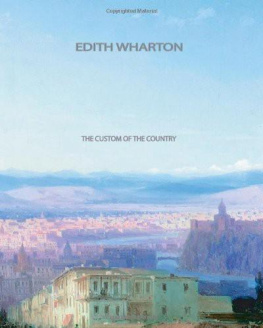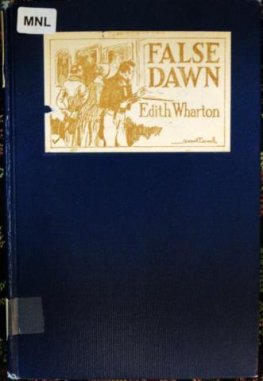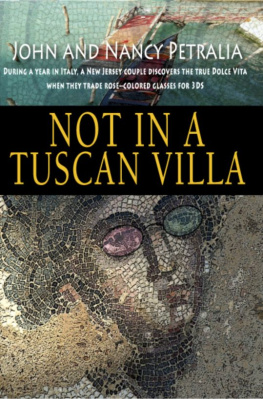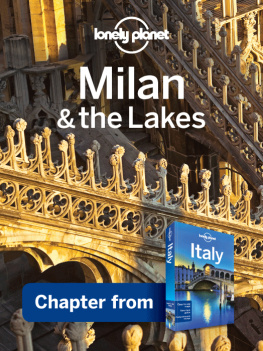Edith Wharton - Italian Backgrounds
Here you can read online Edith Wharton - Italian Backgrounds full text of the book (entire story) in english for free. Download pdf and epub, get meaning, cover and reviews about this ebook. year: 2011, publisher: Barnes & Noble, genre: Detective and thriller. Description of the work, (preface) as well as reviews are available. Best literature library LitArk.com created for fans of good reading and offers a wide selection of genres:
Romance novel
Science fiction
Adventure
Detective
Science
History
Home and family
Prose
Art
Politics
Computer
Non-fiction
Religion
Business
Children
Humor
Choose a favorite category and find really read worthwhile books. Enjoy immersion in the world of imagination, feel the emotions of the characters or learn something new for yourself, make an fascinating discovery.
- Book:Italian Backgrounds
- Author:
- Publisher:Barnes & Noble
- Genre:
- Year:2011
- Rating:4 / 5
- Favourites:Add to favourites
- Your mark:
- 80
- 1
- 2
- 3
- 4
- 5
Italian Backgrounds: summary, description and annotation
We offer to read an annotation, description, summary or preface (depends on what the author of the book "Italian Backgrounds" wrote himself). If you haven't found the necessary information about the book — write in the comments, we will try to find it.
Italian Backgrounds — read online for free the complete book (whole text) full work
Below is the text of the book, divided by pages. System saving the place of the last page read, allows you to conveniently read the book "Italian Backgrounds" online for free, without having to search again every time where you left off. Put a bookmark, and you can go to the page where you finished reading at any time.
Font size:
Interval:
Bookmark:
EDITH WHARTON

This 2011 edition published by Barnes & Noble, Inc.
All rights reserved. No part of this publication may be reproduced, stored in a retrieval system, or transmitted, in any form or by any means, electronic, mechanical, photocopying, recording, or otherwise, without prior written permission from the publisher.
Barnes & Noble, Inc.
122 Fifth Avenue
New York, NY 10011
ISBN: 978-1-4114-3932-0
AN ALPINE POSTING-INN
TO the mind curious in contrastssurely one of the chief pleasures of travelthere can be no better preparation for a descent into Italy than a sojourn among the upper Swiss valleys. To pass from the region of the obviously picturesquethe country contrived, it would seem, for the delectation of the cur posiefacileto that sophisticated landscape where the face of nature seems moulded by the passions and imaginings of man, is one of the most suggestive transitions in the rapidly diminishing range of such experiences.
Nowhere is this contrast more acutely felt than in one of the upper Grisons villages. The anecdotic Switzerland of the lakes is too remote from Italy, geographically and morally, to evoke a comparison. The toy chalet, with its air of self-conscious neatness, making one feel that if one lifted the roof it would disclose a row of tapes and scissors, or the shining cylinders of a musical box, suggests cabinet-work rather than architecture; the swept and garnished streets, the precise gardens, the subjugated vines, present the image of an old maid's paradise that would be thrown into hopeless disarray by the introduction of anything so irregular as a work of art. In the Grisons, however, where only a bald grey pass divides one from Italy, its influence is felt, in a negative sense, in the very untidiness of the streets, the rank growth of weeds along the base of rough glaring walls, the drone of flies about candidly exposed manure-heaps. More agreeably, the same influence shows itself in the rude old centaur-like houses, with their wrought-iron window-grilles and stone escutcheons surmounting the odorous darkness of a stable. These are the houses of people conscious of Italy, who have transplanted to their bleak heights, either from poverty of invention, or an impulse as sentimental as our modern habit of "collecting," the thick walls, the small windows, the jutting eaves of dwellings designed under a sultry sky. So vivid is the reminiscence that one almost expects to see a cypress leaning against the bruised-peach-coloured walls of the village douane; but it is just here that the contrast accentuates itself. The cypress, with all it stands for, is missing.
It is not easy, in the height of the Swiss season, to light on a nook neglected by the tourist; but at Splgen he still sweeps by in a cloud of diligence dust, or pauses only to gulp a flask of Paradiso and a rosy trout from the Suretta lakes. One's enjoyment of the place is thus enhanced by the pleasing spectacle of the misguided hundreds who pass it by, and from the vantage of the solitary meadows above the village one may watch the throngs descending on Thusis or Chiavenna with something of the satisfaction that medival schoolmen believed to be the portion of angels looking down upon the damned. Splgen abounds in such points of observation. On all sides one may climb from the alder-fringed shores of the Rhine, through larch-thickets tremulous with the leap of water, to grassy levels far above, whence the valley is seen lengthening southward to a great concourse of peaks. In the morning these upper meadows are hot and bright, and one is glad of the red-aisled pines and the onyx-coloured torrents cooling the dusk; but toward sunset, when the shadows make the slopes of turf look like an expanse of tumbled velvet, it is pleasant to pace the open ledges, watching the sun recede from the valley, where mowers are still sweeping the grass into long curved lines like ridges of the sea, while the pine-woods on the eastern slopes grow black and the upper snows fade to the colour of cold ashes.
The landscape is simple, spacious and serene. The fields suggest the tranquil rumination of generations of cattle, the woods offer cool security to sylvan life, the mountains present blunt weather-beaten surfaces rather than the subtle contours, wrinkled as by meditation, of the Italian Alps. One feels that it is a scene in which nothing has ever happened; the haunting adjective is that which Whitman applies to the American landscape"the large unconscious scenery of my native land."
Switzerland is like a dinner served in the old-fashioned way, with all the dishes put on the table at once: every valley has its flowery mead, its "horrid" gorge, its chamois-haunted peaks, its wood and water-fall. In Italy, the effects are brought on in courses, and memory is thus able to differentiate the landscapes, even without the help of that touch of human individuality to which, after all, the best Italian scenery is but a setting. At Splgen, as in most Swiss landscapes, the human interestthe evidences of man's presenceare an interruption rather than a climax. The village of Splgen, huddled on a ledge above the Rhine, sheepishly turns the backs of its houses on the view, as though conscious of making a poor show compared to the tremendous performance of nature. Between these houses, set at unconsidered angles, like boxes hastily piled on a shelf, cobble-stone streets ramble up the hill; but after a few yards they lapse into mountain paths, and the pastures stoop unabashed to the back doors of the village. Agriculture seems, in fact, the little town's excuse for being. The whole of Splgen, in midsummer, is as one arm at the end of a scythe. All day long the lines of stooping figuresmen, women and children, grandfathers and industrious babesspread themselves over the hill-sides in an ever-widening radius, interminably cutting, raking and stacking the grass. The lower slopes are first laid bare; then, to the sheer upper zone of pines, the long grass, thick with larkspur, mountain pink and orchis, gradually recedes before the rising tide of mowers. Even in the graveyard of the high-perched church, the scythes swing between mounds overgrown with campanulas and martagon lilies; so that one may fancy the dust of generations of thrifty villagers enriching the harvests of posterity.
This, indeed, is the only destiny one can imagine for them. The past of such a place must have been as bucolic as its present: the medival keep, crumbling on its wooded spur above the Rhine, was surely perched there that the lords of the valley might have an eye to the grazing cattle and command the manuvres of the mowers. The noble Georgiis who lived in the escutcheoned houses of Splgen, and now lie under such a wealth of quarterings in the church and graveyard, must have been experts in fertilizers and stock-raising; nor can one figure, even for the seventeenth-century mercenary of the name, whose epitaph declares him to have been "captain of his Spanish Majesty's cohorts," emotions more poignant, when he came home from the wars, than that evoked by the tinkle of cow-bells in the pasture, and the vision of a table groaning with smoked beef and cyclopean cheeses.
So completely are the peasants in the fields a part of the soil they cultivate, that during the day one may be said to have the whole of Splgen to one's self, from the topmost peaks to the deserted highroad. In the evening the scene changes; and the transformation is not unintentionally described in theatrical terms, since the square which, after sunset, becomes the centre of life in Splgen, has an absurd resemblance to a stage-setting. One side of this square is bounded by the long weather-beaten front of the posting-innbut the inn deserves a parenthesis. Built long ago, and then abandoned, so the village tradition runs, by a "great Italian family," its exterior shows the thick walls, projecting eaves and oval attic openings of an old Tuscan house; while within, a monastic ramification of stone-vaulted corridors leads to rooms ceiled and panelled with sixteenth-century woodwork. The stone terrace before this impressive dwelling forms the proscenium where, after dinner, the spectators assemble. To the right of the square stands the pale pink "Post and Telegraph Bureau." Beyond, closing in the right wing at a stage-angle, is a mysterious yellowish house with an arched entrance. Facing these, on the left, are the
Font size:
Interval:
Bookmark:
Similar books «Italian Backgrounds»
Look at similar books to Italian Backgrounds. We have selected literature similar in name and meaning in the hope of providing readers with more options to find new, interesting, not yet read works.
Discussion, reviews of the book Italian Backgrounds and just readers' own opinions. Leave your comments, write what you think about the work, its meaning or the main characters. Specify what exactly you liked and what you didn't like, and why you think so.












